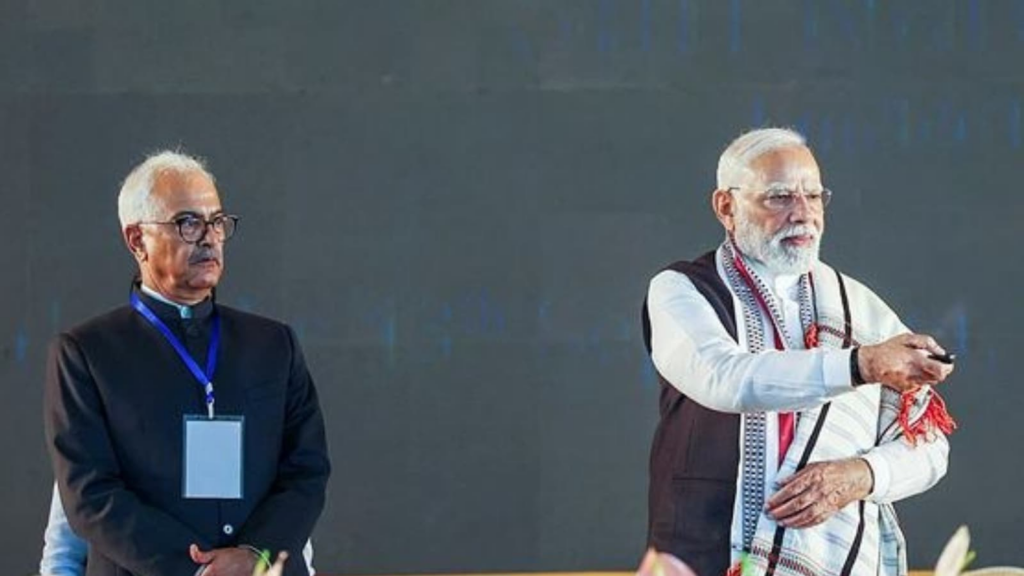During his visit to strife-torn Manipur Saturday, Prime Minister Narendra Modi made a statement on the current political turmoil in Nepal, hailing the formation of an interim government led by Sushila Karki in Kathmandu.
He described the constructive engagement of youth in Nepal civic affairs following the uprising as a “signal of a new dawn”.
Addressing a gathering at Kangla Fort in Imphal — his first speech in Manipur capital since the eruption of ethnic conflict in the state in May 2023 — Modi, while focusing on peace and development at home, briefly touched upon the affairs of Nepal, where days of violence and unrest culminated in the fall of the K P Sharma Oli government and the swearing-in of former Chief Justice of Nepal Sushila Karki as the interim PM.
“Today, from this land of Manipur, I will also talk to my friends in Nepal. Nepal is India’s friend, a close friend. We have shared history and faith. We are moving forward together. On behalf of 140 crore Indians, I congratulate Sushila ji for taking over the reins of the interim government,” Modi said.
He added that Karki “will strengthen the road to peace, stability and prosperity in Nepal”.
Significance of woman PM
Karki, 73, has assumed office as Nepal’s first woman Prime Minister. Modi underlined it, calling her elevation a milestone for gender empowerment in South Asia.
“Sushila ji’s taking over as the first woman PM of Nepal is a great example of women empowerment,” he said.
In recent years, Modi has made women-led growth and grassroots empowerment central to his political messaging at home. By framing Karki’s rise in the same terms, he appeared to create its resonance in Nepal, a country with which India shares open borders, close people-to-people ties and deep cultural affinity.
Message to youth
Modi also spoke directly to the youth of Nepal, who spearheaded the protests that forced the political reset in Kathmandu. He praised not just their activism but also the constructive civic spirit on display in its aftermath.
“One thing that has been missed in what has happened in Nepal over the past couple of days is the way the youth have been seen cleaning the streets and painting the area. I have seen their pictures on social media. This constructive idea and work is a signal of a new dawn in Nepal. I wish Nepal a bright future,” Modi said.
His comment was read as a conscious effort to highlight the non-violent, participatory aspects of the uprising and to encourage Nepal’s youth to see themselves as stakeholders in building democratic institutions in their country.
View from Manipur
That Modi chose to speak on Nepal from Manipur, a border state with its own history of unrest, lent added resonance to his remarks. His speech in Imphal was largely focused on bridging the divide between the Meitei-dominated valley and the Kuki-Zo-dominated hills, but the brief reference to Nepal carried a message that instability across borders would be watched closely by New Delhi.
India’s stake in Nepal’s stability
New Delhi has historically played a crucial role in Nepal’s political transitions, from the end of monarchy to the drafting of the republican constitution. While careful not to be seen as intervening in Nepal’s domestic matters, Modi’s message of support for Karki’s interim government and confidence in her leadership seemed to be aimed at reassuring both Kathmandu and the international community of India’s backing for a peaceful transition in the neighbouring country.
An official told The Indian Express that India’s relations go far beyond just being neighbours with Nepal. “Stability in Nepal is essential for border security, cross-border trade, and the welfare of millions of Nepali workers employed in India,” the official said.
Looking ahead
While the shape of Nepal’s long-term political settlement remains uncertain, Modi’s emphasis on youth energy and women’s leadership suggested that New Delhi sees opportunity in the crisis. “I praise each such individual in Nepal who, despite such atmosphere of instability, has upheld democratic values,” he said in his Imphal speech.
The coming weeks will test Karki’s interim government. However, India appears to have sent out a clear signal: It stands behind Nepal’s democratic forces, hoping that its closest Himalayan neighbour would turn a period of upheaval into a moment of renewal.

